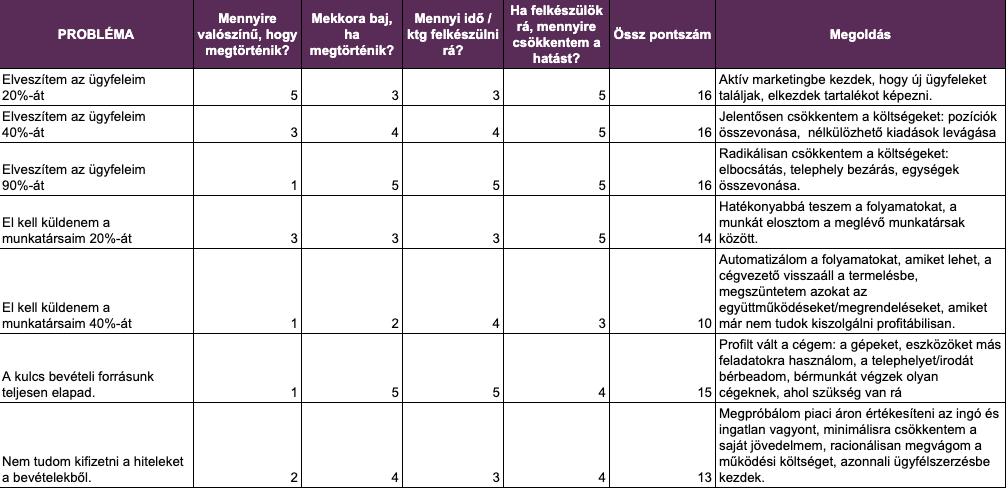4 years ago, I wrote my last blog post on crisis topics and unfortunately, the time has come again. At that time, COVID put businesses, and people in general, in a difficult situation. Now, because of an economic crisis, we entrepreneurs are thinking, calculating, and planning again & again. Naturally, online marketing changes fast too, in times like these.
Unlike COVID, which struck us suddenly, unexpectedly, but very quickly, the current economic situation is creeping into our daily lives more slowly and insidiously. In my opinion, this makes it much more dangerous. 4 years ago, we were forced to act immediately, but now it seems there is time to delay. To change slowly. It seems…
You heard about the frog that, when thrown into hot water, jumps out, but if the water is slowly heated, it boils to death because it doesn’t notice the danger?
Based on the experiences of the last difficult situation (which was more of a crisis for most businesses than a prolonged hardship), I have compiled the factors and tasks that can help your business survive now.
1. Don’t panic – plan
I started with this point last time, and it’s not a coincidence. Although this is not entirely marketing, it’s more about company management, but you can also apply it to marketing. It’s not possible to make good, forward-thinking decisions when you’re overwhelmed with emotions! Have a narrow field of vision, and are filled with anxieties. Sensible thoughts can only be developed calmly, considering all factors. So if you feel at first that you need to kick everything immediately, don’t. Prepare a contingency plan considering various possibilities. You still have time to prepare for different scenarios: set up a good, worse, moderately bad scenario, and of course, the worst one too. Pair an action plan with each scenario about what you will do if it happens, including what to do in online marketing to minimise the effects and maximise the opportunities.
Start with gathering information
- What is the problem?
- How likely is it to happen?
- How bad is it if it happens?
- How much time/money does it take to prepare for it?
- How much can you reduce the impact with preparation?
- What is the possible solution?
I have a table for this. Fortunately, I rarely have to use it, but it’s very good to have it and it’s written down because it provides security. I also have very specific points (e.g., what happens if Facebook withdraws from Europe, or if online marketing is nationalized – it’s unlikely, but I have a plan for that too). I’ll show you a more general example table:

When communicating with your colleagues, clients, and partners, make sure to stay calm. As a leader, you need to set an example, rather than exacerbating the already uncertain situation. Be clear, empathetic, and even if you are overcome by panic (which I think happens to all of us from time to time), still be careful not to scare anyone more than necessary. In uncertain times, it’s often a big achievement to provide security in what you can: for example, in the quality of your service, delivery, helpfulness of your customer service, and keeping jobs.
2. Improve your efficiency
In a crisis, our first thought is to cut costs. But the only way to do this is not to go through radical processes: lay off your colleagues, cut marketing spending, close down your site. Unfortunately, this may well be the case, but think about whether it’s time.
Instead, thoroughly review your business and processes. Were all the spent forints spent wisely? Did you work with the best colleagues, or are there some in the system who aren’t that good, but you didn’t mind keeping them until now? Are there a lot of processes that could be automated, but you’re still solving them daily with human resources? Did you know that even as a small business, you have numerous opportunities for automation and leveraging artificial intelligence?
Focusing on online marketing: Is your website perfect? Is it fast enough, is the purchasing process simple, or is your cart abandonment rate 70%? Are your ads performing well enough? In this situation, you need to know exactly what results you’re achieving from what spending. Are you taking advantage of the online marketing opportunities provided by Facebook, Instagram, and other social media platforms (Instagram marketing, TikTok marketing)? Is your ROI high enough? Is your bounce rate and CT cost low enough? If you don’t know what these mean, it’s time to dig deeper into the topic because this knowledge can be life-saving. To start, here’s a collection of the most important online marketing terms.
If you’re not sure about efficiency, you can do two things:
- Learn the processes. When I was a beginner entrepreneur, I didn’t have money for the best professionals for a long time: I did HR, finance, legal issues, and even office cleaning myself. It’s essential to invest time and energy into understanding these because it saves you a lot and spares you from many mistakes. This can truly be a lifesaver in a crisis.
- Hire professional experts. A tax advisor, a lawyer, a marketer. Someone who can likely do these tasks more professionally, quickly, and efficiently.
- Audit: get an independent, expert audit of your marketing processes. An external expert can look at your systems from the top, bringing in new perspectives. Through thorough research and data analysis, he can identify improvement points that will give you a measurable percentage improvement (e.g. by reviewing a misspent budget) and give you ideas to generate more revenue. We also make them, you can request a quote here.
If you want to review your online marketing processes, we offer various audit services for this purpose:

3. Attack is the best form of defence: switch to a higher gear in online marketing too
For me, this has always been the best strategy. Instead of panicking, try to be one step ahead of the market: I know that in such an uncertain, unpredictable economic environment, this is very difficult, but not impossible. Read economic news and analyses, talk to other business leaders. Call your competitors, the other market players, brainstorm together about what strategy each will follow. More eyes see more, more brains and more experience go further. Watch your competitors, analyze the competition (you can find help here), because you can filter out a lot from their movements.
Improve your products and services:
assess what your customers need, and provide better quality, faster, more accurate service, provide a higher quality product with faster delivery, stronger customer service. Deliver a higher quality product with faster delivery and stronger customer service. I expect a big market clearing: scammers, those who work in poor quality, those who sell bad products will disappear because the better ones will pull far ahead of them. Be part of the latter group and improve your quality as much as possible.
Don’t cut off your revenue source!
Many people start tightening their belts by reducing marketing costs, which reduces their income and security. COVID was a good example of this: those who spent more and smarter on marketing gained an almost insurmountable market advantage over those who slowed down or stopped. At times like these, the advertising noise decreases, which can also lead to a decrease in advertising costs, so it is a really good field for those who can think strategically.
For example, in a difficult situation, in a crisis, I double my spending at least, communicate more actively (e.g. in the Marketing MSc podcast, newsletter, Facebook or Instagram, even on YouTube), use more channels. I push what fits through the pipe, because this is how I can retain my existing customers (remember, marketing is not just about acquiring new customers!), increase the “basket value” (the amount my customers spend with me), promote repeat purchases (in my case, long-term contracts), improve customer satisfaction, and of course, acquire new customers. With the money I earn, I build up a reserve, so that when times get tough, I have something to fall back on, and I spend even more on training (which is a prerequisite for development and quality improvement), process improvement (to serve more customers more efficiently), and of course marketing.
4. Patience. And even more patience. And moderation.
I experience firsthand that general frustration dominates the public mood. People, companies, your customers are uncertain, anxious, panicking, and this tension has to come out somewhere. It can come out in the form of angry Facebook comments, dissatisfied customer emails, terminated contracts. I also feel that I am more impatient than usual, and so are those who are in contact with me. If I write an article that has a typo, they immediately jump on it, if I send a newsletter, I get 1-1 dissatisfied response, which is not related to the content of the email, but to politics, or to the fact that someone has been waiting for an offer from us for 6 months.
Be prepared for an increase in difficult human situations, communication situations requiring solutions, negative comments. It is important to try to remain patient and bring out the greatest empathy package you have ever collected. It does not do good to your soul or your business if you get involved in every unworthy situation and start a debate, but it is important to protect yourself from baseless attacks, opinions. You can find help with moderation in this article.
The situation we face in the period ahead is not easy
However, with careful preparation and resilience it is certainly survivable. The market will split, the good ones will pull ahead, the less good ones will drop off. Efficiency will receive unprecedented emphasis. I wish you perseverance and strength to do this! If our online marketing team can help you in any way, you can reach us here. And if you’re looking for me, Noémi personally, I offer free consultations to support small businesses in Hungary, giving you the best of my knowledge. In this case, you can reach me at: matyko.noemi@chiro.hu
If you found the article useful, please share it. You also support me with it, and the Hungarian business sphere as well.




